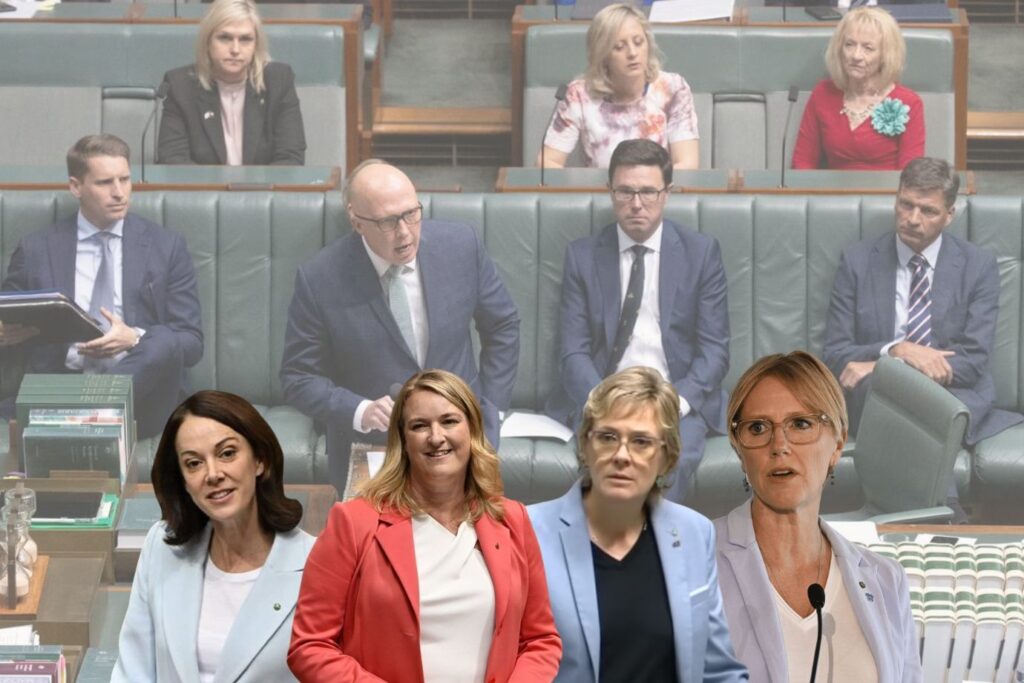If we can’t expect some basic decency standards in parliament among our elected officials, how can we expect it elsewhere, especially at a time of diminishing social cohesion in Australia?
Such decency expectations continue to fall flat, even after increased media scrutiny on the issue and several years since the Set The Standard report was tabled in Parliament.
Today, several independents have come together to call out misogyny in Parliament, describing the behaviour as ‘unacceptable’.
Their pleas for change come as stats show Coalition MPs have been ejected from Parliament almost 200 times since May 2022, with some MPs entering the double digits of being removed.
The poor behaviour is evident during Question Time as strategic tactics are deployed to attack key members of parliaments while heckles and shouting can be heard constantly during what is supposed to be a time for debate over key policies.
The behaviour continues outside of Question Time and parliament well into the media, with politicians taking to various platforms to share their views on other parliamentarians — including an example this week from Senator Matt Canavan who described independent Zali Steggall and the female-dominated crossbench as “the most entitled politicians in our parliament”, during an interview with Sky news.
Independent MP for North Sydney Kylea Tink says the ongoing behaviour in Parliament indicates that the Coalition “still has a woman problem.”
“I’ve become used to this type of condescending, unprofessional, and often misogynistic behaviour from several male MPs from the Liberal and National parties,” she shared in a statement this morning.
“It’s not just me – many people, often women, face this sort of behaviour in Parliament – the likes of which would not be accepted in any other workplace. It’s clear the Coalition still has a woman problem, and I doubt Peter Dutton has the backbone to call it out.”
Tink’s crossbench colleague, Dr Scophie Scamps, described the behaviour as detrimental to respectful debate.
“It’s disappointing to witness the often unnecessarily aggressive behaviour by Coalition members in the chamber, including shouting over the top of people who are speaking rather than engaging in respectful debate.”
Today, Minister for Women Katy Gallagher has unveiled plans for a new body with powers to sanction federal politicians with fines of up to $11,000 for misbehaviour. The body also includes options to sack politicians from parliamentary committees, which was a key recommendation in the Set the Standard report released in 2021.
As currently proposed, the body can not investigate or sanction politicians for comments made under parliamentary privilege, which means words shared during Question Time would not be covered.
Australia has experienced a significant drop in social cohesion over the past year, dropping to its lowest rate on record, according to the Scanlon-Monash Index. This latest report found Australians’ sense of social inclusion and justice has been declining.
Meanwhile, misinformation and misinformation is on the rise internationally and in Australia, leading to individuals being wrongfully identified as perpetrators of violence (such as in the case of the Westfield Bondi attack in Sydney) and leading to public disorder and riots, such as in the UK recently where violence broke out following the release of a false narrative that the 17-year-old charged with murdering three girls in Southport was Muslim and had recently arrived in the UK as a migrant.
Australia’s intelligence agency, ASIO, has issued concerns about “more Australians are being radicalised and radicalised more quickly”, leading to ASIO racing the terror threat from “possible” to “probable”.
In the UK, Home Secretary Yvette Cooper is so concerned about misogyny that she’s ordered a counter-terrorism review to determine how best to tackle threats of “extremist ideologies”, including hatred of women as an ideological trend.
Debate, and often heated debate, is to be expected in parliament.
But there are key opportunities for parliamentarians to demonstrate how such debates can be carried out in respectful and professional ways that acknowledge the growing diversity of the parliament and reflect the kind of standards we hope to see in the community.


